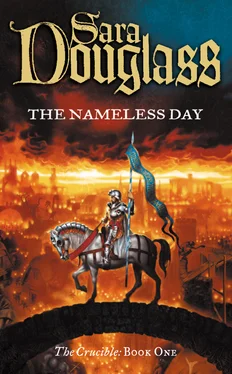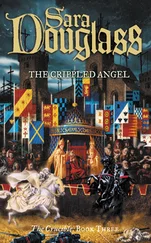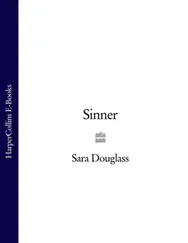No cursed French cardinal was going to lock them out again.
Constantly shifting, murmuring groups of people—peasants in from the surrounding countryside, street traders, prostitutes, foreign pilgrims, elders, out of work mercenaries, lovers, thieves, wives, clerks, washerwomen, schoolmasters and their students—drifted through the precincts of St Peter’s.
The threat wasn’t even implied. The mob shouted it periodically through the windows of the buildings adjoining St Peter’s: elect a Roman pope, a good Italian, or we’ll storm the buildings and kill you.
The cardinals had caused a block and headsman’s axe to be placed in St Peter’s itself, a clear response to the mob: attack us and we’ll destroy you.
There was even a rumour that the cardinals had shifted the treasures of the papal apartments, and of St Peter’s itself, to fortified vaults in the Castel St Angelo. Certainly St Peter’s glittered with less gold and jewels than it once had.
Rome waited uneasily, the cardinals plotted defiantly, and Gregory’s corpse lay stinking before the shrine of St Peter.
Thomas, waiting as anxiously as anyone else, kept himself busy in the library of St Angelo’s friary. Gregory’s funeral mass would be held in a few days, and a few more days after that the cardinals would meet to elect their new master. Thomas imagined late at night when he lay unsleeping on his hard bunk in his cell, that he could hear the clatter of gold and silver coins being passed from hand to hand atop the Vatican hill where sprawled the Leonine City. The noise of the cardinals passing and accepting bribes, the normal procedure before the election of a pope. He even imagined he could hear the fevered rattle of horses’ hooves racing through the night, bearing ambassadors from the kings and emperors of Europe, who themselves bore in tight fists a variety of carefully couched threats and intimidations to ensure that their particular master’s man was elected to the Holy Throne.
A bad business indeed, Thomas thought. The higher clergy should be shining examples of piety and morality to the rest of Christendom. Instead the cardinals had opened their souls to corruption.
Evil?
Were the cardinals the enemy against whom he would lead the soldiers of Christ?
Thomas tossed and turned, but until the papal election—or until the blessed archangel Michael revealed more—there was nothing to do but wait, and listen, and watch.
And, during those daylight hours not spent in prayer, study the registers of St Angelo’s.
St Angelo’s had for generations been the centre of the Dominican effort to train the masters and teachers of the growing European universities, and this mission (the reason Thomas himself had been sent to the friary) was reflected in the registers. Thomas found himself curious as he saw the names of now-aged masters he’d studied under at Oxford, and the names of masters famed for their learning who currently taught, or had taught, at the universities of Paris, Bologna, Ferrara and Padua. They had all come to St Angelo’s, and Thomas traced their comings and goings: their arrival at the friary as young men, their long years spent moving from cell to chapel, to refectory, to library, to chapel and then back to cell again.
Thomas smiled to himself as his finger carefully traced over the black spidery writing in the registers. He could hear their footsteps as they trod the same corridors he trod every day. He could feel their excitement as they pored over the same books he did, and at night he imagined that he lay in the same cell that some learned and pious Master of Paris or Bologna or Oxford had once reposed in many years previously.
The records showed nothing but the same continuous, comforting pattern of piety and learning, and Thomas thought that was as all Christendom should be. Never changing, but keeping to the ancient and tested ways, the comforting rituals, all under the careful guardianship of the Church, the custodian and interpreter of the word of God.
Only thus could evil be kept at bay.
On this cold April day Thomas came back to the library after Vespers to continue his study until the bells rang for Compline. Few other brothers had come back: the library was too cold this late in the evening.
But Thomas was drawn back, not only by his need to continue his study, but by a compulsion he couldn’t name.
There was something in the registers he needed to read. He knew it. St Michael had not actually appeared and told him so, but Thomas knew the archangel was guiding his interest.
Thomas had been reading the registers for the 1330s, and, as he pored over the unwieldy parchment rolls under his sputtering lamp, he suddenly realised what had been making him uncomfortable for the past few days.
There was an inconsistency within the registers.
St Angelo’s brothers moved through the registers in regular patterns: arriving at the friary, staying months or sometimes years to study, and then departing. During their time at the friary their daily routines never varied: prayers, meals, study.
But there was one friar who did not fit the pattern at all. His name ran through the records like a nagging toothache; he was a part of St Angelo’s community, but an unsettling part. For months he would move through the registers as other friars did, not varying his routine from theirs in the slightest manner—although, Thomas noted, he took no part in the weekly debates.
Then, twice a year, he would vanish from the registers for some eight weeks, before his name reappeared within the comfortable routine.
There was no explanation for his absences, and these continuing absences were abnormal. Friars came to St Angelo’s, they stayed awhile, then they left. They didn’t keep coming and going in such a fashion. If they had business elsewhere, then they travelled to that elsewhere and stayed there. They did not spend years using St Angelo’s as some tavern in which to bide their time until they needed to return to their true business.
The first year that Thomas had encountered the friar’s unexplained comings and goings he had simply assumed that the friar had some pressing business to attend to in another friary—something that had reluctantly pulled him away. But then the same pattern was repeated the next year, and then the next, and continued in the years after. The friar’s departures and returns were consistent: he left the friary in late May of each year and returned in late July, then he left again in early December and returned by the end of January.
Why?
Further, there was another inconsistency. If a friar did have to leave the friary, for whatever matter, then he had to seek permission from the prior, and that permission, as the reason for the absence, was recorded. During the 1330s three other brothers had left briefly, and the reasons, along with the prior’s permission, had been recorded in the registers.
Not so for this man.
Troubled, Thomas checked back through the records for the 1320s, trying to find when the friar had first arrived…to his amazement and increasing unease, Thomas discovered that the friar had been moving in and out of St Angelo’s all through the 1320s.
All without apparent permission, and always twice each year at the same time.
In late 1327 the incumbent prior had died, and when, five months after the new prior had been elected, this troubling friar had again departed without explanation, there was a record that the new prior had requested an interview with the friar on his return, no doubt to demand an explanation.
And there, at Lammas in 1328, was the record showing the interview had taken place on the friar’s return. The only comment on the outcome of this interview was, to Thomas’ mind, an outrageous statement that the friar was to be allowed to come and go as he pleased.
Читать дальше












